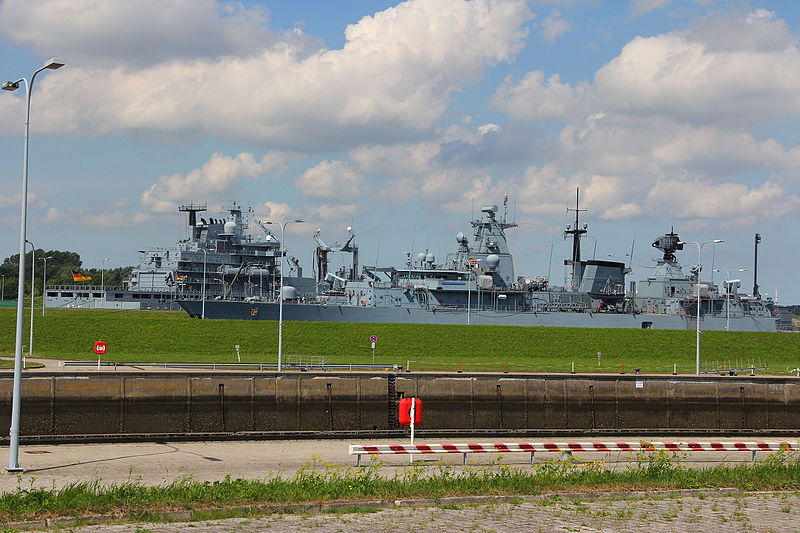As tensions continue to mount over the South China Sea, other nations are poised to monitor the situation in an effort to prevent any full-scale war from happening. This time, Germany has now deployed a few warships into the waters for the first time in almost 20 years.
This week, Germany has deployed a warship into the South China Sea to go on a six-month mission in the Indo-Pacific. Germany’s foreign minister said that the move was to stand up for values and interests. It also comes as China insists on having sovereignty over the majority of the body of water, which an international tribunal has ruled against.
The warship called the Bayern left the Wilhelmshaven harbor with 200 soldiers on board. The ship is expected to pass through the South China Sea by December. German officials said that the ship will be adhering to common trade routes and that it is not expected to pass through the Taiwan Strait.
“The message is clear: We are standing up for our values and interests together with our partners and allies,” said Defense Minister Annegret Kramp-Karrenbauer to Reuters. “For our partners in the Indo-Pacific, it is a reality that sea routes are no longer open and secure, and that claims to territory are being applied by the law of might is right.”
“The Indo-Pacific is where the shape of the international order of the future will be decided,” said German Foreign Minister Heiko Maas. “We want to help shape it and take responsibility for the rules-based international order.”
Germany’s deployment of warships into the South China Sea follows the deployment of two UK warships that would be permanently stationed in the waters. Both countries are following the US, which has already built a naval presence in the body of water.
Meanwhile, in an interview with Express, UK Conservative MP and chair of the House of Commons Defense Select Committee Tobias Ellwood said that China does not actually want a military conflict despite its constant threats and constant boast of military strength, but there would be more of a conflict of political ideologies especially with western nations.
“Regarding military aggression, my concern is that China is not wanting to go to war, to have a battle, to be fighting in the old sense of the conventional terms,” said Ellwood. “My concern is that we are going to see a clash of political ideology. For example in the South China Sea, China is advancing its interests and it could then bump into Western interests. This is as we ourselves start to wake up and become less risk-averse in standing up for what we believe in.”



 Trump to Address Nation as U.S. Launches Strikes in Iran, Axios Reports
Trump to Address Nation as U.S. Launches Strikes in Iran, Axios Reports  AI is already creeping into election campaigns. NZ’s rules aren’t ready
AI is already creeping into election campaigns. NZ’s rules aren’t ready  Zelenskiy Urges Change in Iran After U.S. and Israeli Strikes, Cites Drone Support for Russia
Zelenskiy Urges Change in Iran After U.S. and Israeli Strikes, Cites Drone Support for Russia  UK Accepts U.S. Request to Use British Bases for Defensive Strikes on Iranian Missiles
UK Accepts U.S. Request to Use British Bases for Defensive Strikes on Iranian Missiles  Middle East Conflict Escalates After Khamenei’s Death as U.S., Israel and Iran Exchange Strikes
Middle East Conflict Escalates After Khamenei’s Death as U.S., Israel and Iran Exchange Strikes  Argentina Tax Reform 2026: President Javier Milei Pushes Lower Taxes and Structural Changes
Argentina Tax Reform 2026: President Javier Milei Pushes Lower Taxes and Structural Changes  Israel Launches Fresh Strikes on Iran After Death of Supreme Leader Ayatollah Khamenei
Israel Launches Fresh Strikes on Iran After Death of Supreme Leader Ayatollah Khamenei  Failure of US-Iran talks was all-too predictable – but Trump could still have stuck with diplomacy over strikes
Failure of US-Iran talks was all-too predictable – but Trump could still have stuck with diplomacy over strikes  Macron Urges Emergency UN Security Council Meeting as US-Israel Strikes on Iran Escalate Middle East Tensions
Macron Urges Emergency UN Security Council Meeting as US-Israel Strikes on Iran Escalate Middle East Tensions  Netanyahu Suggests Iran’s Supreme Leader Khamenei May Have Been Killed in Israeli-U.S. Strikes
Netanyahu Suggests Iran’s Supreme Leader Khamenei May Have Been Killed in Israeli-U.S. Strikes  EU Urges Maximum Restraint in Iran Conflict Amid Fears of Regional Escalation and Oil Supply Disruption
EU Urges Maximum Restraint in Iran Conflict Amid Fears of Regional Escalation and Oil Supply Disruption  HHS Adds New Members to Vaccine Advisory Panel Amid Legal and Market Uncertainty
HHS Adds New Members to Vaccine Advisory Panel Amid Legal and Market Uncertainty  Trump Announces U.S. Strikes on Iran Navy as Conflict Escalates
Trump Announces U.S. Strikes on Iran Navy as Conflict Escalates  Trump Warns Iran as Gulf Conflict Disrupts Oil Markets and Global Trade
Trump Warns Iran as Gulf Conflict Disrupts Oil Markets and Global Trade  Trump Launches Operation Epic Fury: U.S. Strikes on Iran Mark High-Risk Shift in Middle East
Trump Launches Operation Epic Fury: U.S. Strikes on Iran Mark High-Risk Shift in Middle East  Suspected Drone Strike Hits RAF Akrotiri Base in Cyprus, Causing Limited Damage
Suspected Drone Strike Hits RAF Akrotiri Base in Cyprus, Causing Limited Damage  Why did Iran bomb Dubai? A Middle East expert explains the regional alliances at play
Why did Iran bomb Dubai? A Middle East expert explains the regional alliances at play 































